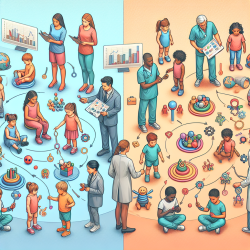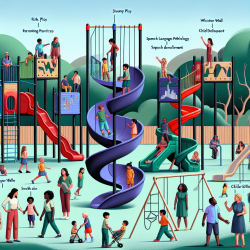As a speech-language pathologist dedicated to improving outcomes for children, it's essential to stay informed about the latest research and methodologies that can enhance our practice. One such approach is the use of cluster randomized trials (CRTs) in children's therapy, as explored in the research article "Advancing cluster randomised trials in children’s therapy: a survey of the acceptability of trial behaviours to therapists and parents."
CRTs are a powerful tool for evaluating the effectiveness of therapy interventions. Unlike traditional randomized controlled trials (RCTs), CRTs randomize groups or clusters (e.g., therapy teams, schools) rather than individuals. This design is particularly useful in therapy settings where interventions are often delivered in group contexts.
The study surveyed UK occupational therapists, physiotherapists, speech and language therapists, service managers, and parents to understand their views on the acceptability of CRTs in children's therapy. Here are some key findings and practical takeaways for practitioners:
- General Acceptability: Both therapists and parents generally found CRTs acceptable and understood how these trials could improve therapy outcomes for children.
- Confidence Levels: Therapists showed varied confidence levels in participating in CRTs. While many felt somewhat confident discussing trials with parents and children, fewer felt confident about agreeing to take part in a trial.
- Perceived Burden: Many therapists perceived participating in CRTs as burdensome, citing concerns about the time, effort, and resources required.
- Support and Resources: Positive attitudes towards CRTs were linked to the support and resources provided, opportunities for professional development, and the ability to maintain professional autonomy.
Given these findings, here are some strategies to improve the implementation and acceptability of CRTs in children's therapy:
- Enhance Support Structures: Ensure that adequate support and resources are available for therapists participating in CRTs. This includes training, administrative support, and clear communication channels with research teams.
- Promote Professional Development: Highlight the learning and development opportunities that come with participating in CRTs. This can help boost therapists' confidence and engagement.
- Maintain Professional Autonomy: Respect therapists' professional judgment and autonomy by involving them in the trial design and decision-making processes.
- Address Time and Resource Concerns: Clearly outline how participation in CRTs will fit into therapists' existing workloads and provide solutions to manage any additional time and resource requirements.
By implementing these strategies, we can enhance the feasibility and acceptability of CRTs in children's therapy, ultimately leading to better outcomes for the children we serve.
To read the original research paper, please follow this link: Advancing cluster randomised trials in children’s therapy: a survey of the acceptability of trial behaviours to therapists and parents.










